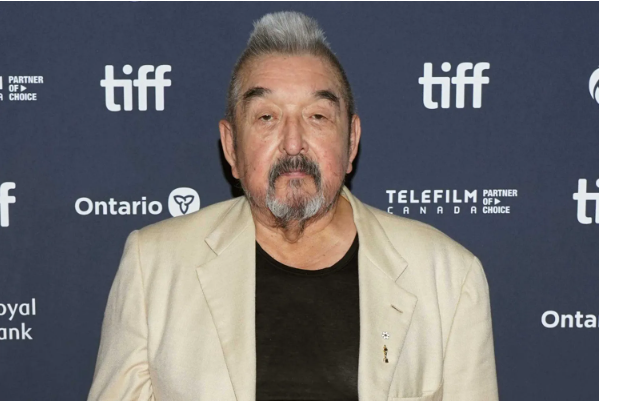1. A Gentle Farewell: The Final Chapter
Graham Greene, the celebrated Canadian First Nations actor whose soaring career spanned decades, passed away peacefully at the age of 73 on September 1, 2025, in Stratford, Ontario. His long-fought illness finally gave way in a quiet exit that mirrored the grace with which he carried himself. Greene’s passing was confirmed by his agents, both of whom spoke of his humility, character, and the deep humanity that marked every performance and every interaction off the screen.
One of his longtime representatives paid tribute with the words, “You are finally free,” a phrase that resonated deeply with fans and colleagues. It captured both the profound sorrow of losing a beloved artist and the recognition that his struggles had come to an end. Greene was remembered not only for his immense body of work but for the quiet dignity with which he navigated an industry that often struggled to fully appreciate Indigenous voices.
The news of his passing spread quickly across the entertainment world, sparking tributes from directors, actors, and fellow First Nations performers who credited Greene as a trailblazer. For many, his death was not just the loss of an actor, but the end of an era that he helped shape with his authenticity and groundbreaking performances.

2. From Stage to Screen: The Birth of an Icon
Born in 1952 on the Six Nations Reserve in Ontario, Greene grew up in a community steeped in tradition, storytelling, and resilience. These early influences would become the foundation for his work, as Graham Greene carried with him the humor, wisdom, and lived experiences of his people. After completing the Center for Indigenous Theatre Program in 1972, Greene began honing his craft on stage, developing a reputation as an actor with depth and emotional precision.
Graham Greene’s first film appearance came in 1983 with Running Brave, but it was his role as Kicking Bird in the 1990 film Dances with Wolves that catapulted him to international stardom. The film, directed by Kevin Costner, became a cultural phenomenon, and Greene’s performance earned him an Academy Award nomination for Best Supporting Actor. This recognition was not only a personal triumph but a landmark moment for Indigenous actors in Hollywood.
For audiences, Greene’s portrayal of Kicking Bird was both powerful and transformative. Graham Greene imbued the role with quiet strength, wisdom, and humanity—qualities that shattered stereotypes and presented Indigenous characters as fully realized human beings. His work in Dances with Wolves continues to be studied as one of the pivotal performances that shifted Hollywood’s approach to Indigenous representation.
3. Expansive Career: Hall of Roles
Greene’s career after Dances with Wolves was as rich and varied as any actor could hope for. Graham Greene refused to be typecast, moving effortlessly between genres and formats. On the big screen, Graham Greene appeared in acclaimed dramas like The Green Mile, action blockbusters such as Die Hard with a Vengeance, comedies like Maverick, and even fantasy and supernatural tales including The Twilight Saga. Each role showcased his versatility and ability to bring a grounded, authentic presence to any story.
Television also became a vital part of his legacy. Greene’s performances in Northern Exposure, Longmire, Goliath, Riverdale, Reservation Dogs, and The Last of Us expanded his reach to new generations of viewers. He had an uncanny ability to take even small roles and make them unforgettable, using subtle expressions, humor, and warmth to elevate every scene.
His final work, the posthumously released Ice Fall, is expected to be both a tribute and a final gift to his fans. This project will remind audiences once more of the power he brought to the screen, even in his final years.
Greene’s career is a testament to his belief in storytelling as both art and cultural responsibility. Graham Greene chose roles that mattered, that spoke to real experiences, and that left audiences with more than just entertainment—they left with insight.
4. Accolades and Advocacy: Awards and Impact
Over his decades-long career, Greene received numerous awards and accolades that recognized both his artistic talent and his influence in the industry. He was honored with a Grammy, Gemini, Canadian Screen Awards, and the Dora Mavor Moore Award. These honors reflected his ability to cross artistic mediums—acting on stage, on screen, and even in voice work for audio productions.
In 2025, Greene received one of his most significant recognitions: the Governor General’s Performing Arts Award, Canada’s highest honor in the performing arts. Around the same time, he earned a Canadian Screen Award for his supporting performance in Seeds. These accolades symbolized not just a lifetime of artistic contributions but also his role in shaping Canadian and Indigenous cultural identity on the global stage.
Greene was more than an actor; he was an advocate. He challenged Hollywood and Canadian media alike to move beyond stereotypes and tokenism. By consistently choosing roles with integrity, he opened doors for other Indigenous actors and inspired countless young performers to pursue their own dreams. His legacy is not only in the films and shows he left behind but in the broader movement toward authentic representation he helped fuel.
5. A Gentle Presence: Offscreen Life & Family
Away from the spotlight, Greene lived with the same humility that defined his professional choices. He spent over 35 years married to Hilary Blackmore, with whom he shared a quiet and steady partnership. Together, they raised their daughter, Lilly, and later welcomed a grandson, Talo, into their lives. Family remained central to Greene’s world, and those who knew him best spoke of his warmth, humor, and deep love for those closest to him.
He had passions outside of acting—writing, boat building, and golf—that allowed him to stay grounded. Despite his success, he resisted the pull of Hollywood glamour, choosing instead to live in Canada, close to his roots. Greene often spoke about the importance of humor in his culture and in his life, explaining that laughter was a vital way to endure hardships and celebrate joy.
Even in interviews, he maintained a self-effacing charm, downplaying fame while emphasizing the value of storytelling and community. To his colleagues, he was a mentor and friend; to his family, he was a devoted husband, father, and grandfather. His passing leaves behind not only a professional legacy but a personal one—an example of how to live with integrity, authenticity, and love.
From: Doublejoydesigns
